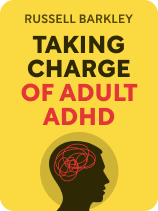

This article is an excerpt from the Shortform book guide to "Taking Charge of Adult ADHD" by Russell Barkley. Shortform has the world's best summaries and analyses of books you should be reading.
Like this article? Sign up for a free trial here.
What is Attention-Deficit/Hyperactivity Disorder? How is ADHD diagnosed?
For many people, struggling with commitments and time management rises to the level of a clinical condition that significantly impairs how they live. That’s precisely what ADHD is—a neurological condition that inhibits how your brain processes information, regulates emotions, and predicts the consequences of your actions.
Let’s discuss how ADHD is defined, where it comes from, and how it’s diagnosed.
What Is ADHD?
What is Attention-Deficit/Hyperactivity Disorder? According to Russell A. Barkley, Attention-Deficit/Hyperactivity Disorder is a condition arising from a biological deficiency of dopamine and norepinephrine—two chemicals commonly found in the brain. These chemicals are both neurotransmitters that govern how nerve cells respond to stimuli. When they’re lacking, certain mental functions don’t work, such as those involved in controlling impulses, making decisions, and planning ahead. People with ADHD also exhibit slower development and less neural activity in the regions of the brain associated with those functions. The root cause may be genetic—the risk for ADHD can run in families—but ADHD can sometimes be traced to brain injuries early in life or even during prenatal development.
(Shortform note: In his 1999 book Scattered Minds, Gabor Maté argues in favor of an alternate view of ADHD—that it isn’t just a biological disorder but one with social and psychological roots. Maté attributes ADHD to early childhood stress that prevented you from developing certain emotional-cognitive capacities that you need to fully thrive. However, Maté’s critics accuse him of oversimplifying complex health issues without providing scientific evidence to support his holistic approach to health care—one that focuses on psychological healing as a substitute for medicinal treatments.)
Barkley is careful to point out that having ADHD isn’t anyone’s fault. Your symptoms don’t reveal that you lack moral fiber, and they aren’t something you can make go away by force of will or self-motivation. Likewise, ADHD symptoms don’t result from either lax or too-strict parenting, nor are they caused by sugar, caffeine, video games, or any of the other myths bandied about by the uninformed from time to time. You can’t help that you have ADHD; you can only control what you do with that knowledge once you’ve been diagnosed.
(Shortform note: In addition to the ADHD symptoms we’ll list in the following section of this guide, people with ADHD sometimes struggle with depression, negative self-talk, and feelings of shame related to their condition. These feelings are often caused by not being able to accomplish simple tasks that others take for granted, such as arriving at appointments on time or being able to focus without distractions. While mindfulness practices and therapy can help cope with these feelings when they arise, so too can understanding the reason for your struggles, as Barkley advocates for in the following section.)
Diagnosing ADHD
In the overwhelming majority of cases, ADHD symptoms begin during people’s formative years. However, while some are diagnosed early, others don’t learn that they have ADHD until well into adulthood. ADHD disrupts your ability to function in numerous ways, but the world of an adult is starkly different than the world of a child—as such, Barkley says that ADHD presents itself differently in adults than in children. To diagnose adult ADHD, doctors assess the following range of factors:
- You’re easily distracted and find it challenging to focus on tasks or activities. For example, during meetings at work or social gatherings, you constantly check your phone, go off on conversational tangents, or get lost in your thoughts.
- You make impulsive decisions and find it difficult to stop unproductive behaviors. For instance, you might frequently buy things you don’t need without considering your budget, or you might spend every morning scrolling through social media instead of starting your work.
- You have a hard time following lists of instructions or doing the steps in the right order. For example, you assemble furniture without reading the instructions first, or you might mix up the sequence of steps in preparing a recipe.
- You struggle to honor commitments. You forget about plans you’ve made with friends, fail to complete tasks you’ve promised to do, and frequently show up late to appointments.
- You have trouble engaging in leisure activities. You prefer high-intensity activities that involve constant movement because you’re too restless to participate in relaxing pastimes.
- You drive too fast. You have a hard time following the rules of the road, are frequently pulled over and ticketed, and may have a history of automobile accidents.
To be clear, most people can lay claim to some or all of the above-listed symptoms from time to time, but in ADHD, these symptoms are persistent and severe enough that they derail your ability to lead a normal life. To receive an ADHD diagnosis, you must have experienced symptoms for at least six months, and they had to have begun before the age of 16. Barkley says that if your symptoms started during adulthood, they’re probably due to something other than ADHD.
For some people, being diagnosed with ADHD can be freeing—at last they have an explanation for their struggles. The bad news is that ADHD rarely comes alone. Four out of every five people with ADHD have accompanying psychiatric problems, including antisocial behavior, anxiety, depression, and problems with substance abuse. It’s possible that some of these are caused by the stress of living with ADHD, but this is why Barkley says it’s important to be properly diagnosed—it’s only when you understand your challenges in full that you and your doctors will be able to tackle them head-on. We’ll cover treatment options in the second half of this guide, but first, let’s explore what having ADHD as an adult is like.

———End of Preview———
Like what you just read? Read the rest of the world's best book summary and analysis of Russell Barkley's "Taking Charge of Adult ADHD" at Shortform.
Here's what you'll find in our full Taking Charge of Adult ADHD summary:
- The various treatment options for ADHD in adults
- How to accept ADHD as a part of your life
- What ADHD can look like in undiagnosed adults






